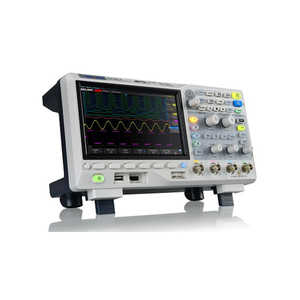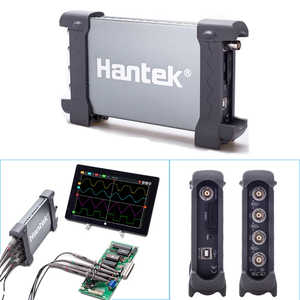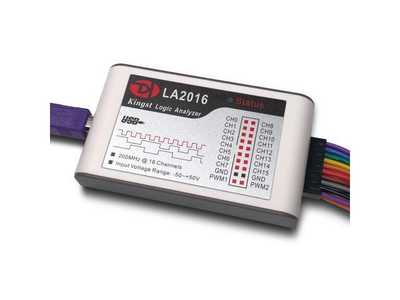Greetings,
I am considering purchasing an oscilloscope. The primary use case in the beginning is to understand how the device works, to measure various signals to better understand electronics, and then to use it as a tool for troubleshooting and further learning.
I am considering the Siglent SDS1104X-E and the Hantek 6254BD. The Siglent has four channels, enough bandwidth for hobby electronics, decent reviews on the YouTube/Amazon, and can be upgraded with more features should I get that far. The idea is to buy once cry once (within the relative domain of hobby electronics).
My second choice is the Hantek USB scope hooked up to my Android tablet. The reasoning behind this choice is that it would be "good enough", and would leave more budget for components etc. I am not crazy about using on screen controls, and I would hate to find I love using an oscilloscope and need to buy again later, but perhaps these are unmerited concerns?
I already have the LA2016 USB logic analyzer for serial debugging, but I have not used it and could still return it if the decoding capabilities of the Siglent are sufficient. The Siglent can be upgraded with a logic analyzer, but it is my understanding that it decodes serial using the four BNC probes which may be enough for embedded devices using serial.
Of course opinions are dangerous, but I would appreciate anyone that is willing to give their insights, experiences, and alternatives.
I have a lot of 'stuff' and can afford to get more stuff but I have no idea why I would need a scope. In my tube days I did use one but with modern digital and solid state I so far do not see the need. Maybe waiting until you have a situation that can only be resolved with a scope is the way to go. I can't imagine a need myself, but YMMV. But, yes cry once.
Why not check with Bill to see what he uses.
First computer 1959. Retired from my own computer company 2004.
Hardware - Expert in 1401, and 360, fairly knowledge in PC plus numerous MPU's and MCU's
Major Languages - Machine language, 360 Macro Assembler, Intel Assembler, PL/I and PL1, Pascal, Basic, C plus numerous job control and scripting languages.
Sure you can learn to be a programmer, it will take the same amount of time for me to learn to be a Doctor.
@zander I absolutely agree. I do not think I need a scope. Mostly I want to play with it to understand how things work even outside the µcontroller world. Your thought process is certainly running though my head as well though. I could buy a bunch of cool toys for the same price, or better yet, not spend money 🙂
EDIT:
@dronebot-workshop Do you have any thoughts on my choices and oscilloscopes in general? Do you own a few? Do you use them regularly?
@arrowj I am normally the first to buy shiny new toys, but scopes are expensive for anything decent and until there is something I can't do without one then it remains on the later/never list.
First computer 1959. Retired from my own computer company 2004.
Hardware - Expert in 1401, and 360, fairly knowledge in PC plus numerous MPU's and MCU's
Major Languages - Machine language, 360 Macro Assembler, Intel Assembler, PL/I and PL1, Pascal, Basic, C plus numerous job control and scripting languages.
Sure you can learn to be a programmer, it will take the same amount of time for me to learn to be a Doctor.
Im no expert, nor do I own a bench oscilloscope. If I were to buy one, it would probably be that Siglent. It seems to be the most recommended in the price range.
Hi @arrowj,
Like most tools, it depends what are you are going to use it for. I have had access to 'scopes for a very long time, so when one it not available, I really miss the convenience of not having one to see what is happening.
Hence, a little while ago I went for the Hantek DSO2D15, which is highest spec version of a family of 4, with numbers 2C10, 2C15, 2D10 & 2D15. The 10s are nominally 100MHz bandwidth, the 15s 150MHz, and the Ds include a low-ish spec arbitrary signal generator.
(I haven't yet used the arb signal generator, but the price increment was small and I thought it might be occasionally be handy. My jury is still out on this one.)
This bandwidth/sampling rate means it can look at most of the sensor and actuator traffic associated with Arduinos, etc., but not the processor/memory traffic, (excepting some of the slower ones), for which you would need 1 GHz and up ... and a lot deeper pocket!
It is 2 channel, though note the max sampling rate halves to 500 M samp/sec in dual channel mode. (This applies to some competitor 'scopes as well - check carefully -- 4 channel can result in sampling at quarter of the headline figure.) It also has a separate trigger input, except when the arbitrary signal generator is in use. In some applications, the trigger input can be as useful as a third channel ... and seems to be one of things that gets omitted from some of the cheaper 'scopes around, including many of the 4 channel scopes.
Pricewise, I paid about £200, including delivery (to UK) and VAT (at 20%) from Banggood. I didn't look too deeply into the 'screenless' modules, such as the Hantek you mention, but my impression is that the price wasn't much different from buying the whole 'scope. I can imagine circumstances, such as production testing where computer controlled modules could be very useful, but I am not in that position, so why not have the whole thing in one box, with real controls knobs, etc?
Is it any good? .. for the price it shows how technology has moved on from Tektronix, etc of a few years back, costing 10 times as much then. It does not have the robust feel of a Tek, etc. either physically or electrically, but it can still show things that are hard to determine in other ways. I hope it lasts long enough for me to get 'my money's worth'.
It is based on Android phone technology, and occasionally it will show some quirky behaviour to remind you of its origins... software updates seem to be fairly frequent (free download), though I haven't tried to apply one yet. There is also a 'community' on the web to help with updates and the like... again, I have read some of the stuff, but not applied it.
I haven't done any detailed checks as to how it compares to the claimed specs ... there are some YouTubes around and they seem generally favourable, but the quality and veracity of such information is hard to verify.
--------
As I started off, only you know what you want it to do. Personally, I do not remember ever using a 4 channel scope ... but I have used the trigger input as a kind of a third channel. If your budget is limited, you might consider if 2 channel + decent trigger input channel scope would meet your requirements. If so, look around the different suppliers to see if you can find something you like. It might be cheaper, leaving you with a little cash for other things.
I hope this helps you consider the options .. I have discussed one particular 'scope, as that is the only current model I have any experience of, but I presume most of the comments apply to the competitive products as well ... which is the best one for you, only you can judge. I make no claims and take no responsibility for my comments!
Best wishes, and good luck. Dave
The DSO2D15 uses android?
Hi @yurkshirelad,
Please note I am only reporting stuff bouncing around the web ... so some (all?) of it may be my or someone else's mistake. I haven't tried to look into it myself. The same applies to this reply!
Seems like it is based on Android technology... though obviously it is not a mobile phone, so please take the suggestion with some large pinches of salt! It is reported as using an Allwinner processor, presumably to do the maths, screen and button handling. It seems it also has an FPGA, presumably to manage the high speed sampling operations, etc.
It has two USB sockets, which share a single USB 'port that supports connection to PC and USB memory stick.
It seems plausible the Android software base would be a good place to get a lot of the human interface side of the scope as open source code.
As for how much the software can be characterised as generic Linux, Android, proprietary scope specific or whatever, I haven't a clue.
Sorry, perhaps I should have been a little careful with my language in that respect, but I was only trying to (briefly) paint a picture of what to expect. My main message was for @arrowj to consider the characteristics of this type of tool - I would not be surprised if at least some of the competitors adopt a similar principle.
It was certainly not to recommend a specific product. I hope I made that clear.
Best wishes, Dave
Caveat first - I'm not a hardware guy. I'm sure someone will tell us how over simplifying I'm being but as I understand it an oscilloscope measures analog values fast enough so you can see transitions, while a logic analyzer is either 0 or 1. I've use the following logic analyzer for all kinds of things, but mainly to study how I2C and SPI work. In the digital world, I can't really see the need for the oscilloscope. IF... all that applies to what you want... this thing was a WHOLE LOT CHEAPER! - 24MHz 8 Channel $12.69. It is plenty fast enough to handle anything I've thrown at it on ESP8266 and Arduinos. When you get the experience under your belt and exhaust its capabilities and have a real reason for an oscilloscope or for a higher rate logic analyzer, you won't mind putting it on the shelf or donating it.
"https://www.amazon.com/HiLetgo-Analyzer-Ferrite-Channel-Arduino/dp/B077LSG5P2/"
https://www.amazon.com/HiLetgo-Analyzer-Ferrite-Channel-Arduino/dp/B077LSG5P2/
3 lines of code = InqPortal = Complete IoT, App, Web Server w/ GUI Admin Client, WiFi Manager, Drag & Drop File Manager, OTA, Performance Metrics, Web Socket Comms, Easy App API, All running on ESP8266...
Even usable on ESP-01S - Quickest Start Guide
@inq I have one of those but still have not found a need for it yet. Either I am lucky, or my projects are different, simpler? What about I2C or SPI would you need to know about other than the API calls? Sorry, I don't get it and I was a hardware guy long before I was a software guy, and when I say software I am ALL levels trained, application languages, OS's, microcode then the hardware. Even as an IBM field engineer I only needed a scope a couple times. I actually would like a reason to get to use the logic analyzer but first I need to learn how to use it, where it connects etc etc.
First computer 1959. Retired from my own computer company 2004.
Hardware - Expert in 1401, and 360, fairly knowledge in PC plus numerous MPU's and MCU's
Major Languages - Machine language, 360 Macro Assembler, Intel Assembler, PL/I and PL1, Pascal, Basic, C plus numerous job control and scripting languages.
Sure you can learn to be a programmer, it will take the same amount of time for me to learn to be a Doctor.
@zander - I completely agree about needing one under any normal circumstances. In fact, I don't recall ever using it in earnest for anything besides the one SPI project and it's rather esoteric. Any other time, it was to just to see how things worked out of curiosity.
The one project and the reason I purchased it... I needed to have two ESP8266 using mutually exclusive modes of WiFi, yet they needed to talk to each other. SPI is the fastest, but I had to make it fully duplex. IOW, I eliminated the master/slave architecture for a peer-to-peer architecture so either ESP8266 could initiate a send.
3 lines of code = InqPortal = Complete IoT, App, Web Server w/ GUI Admin Client, WiFi Manager, Drag & Drop File Manager, OTA, Performance Metrics, Web Socket Comms, Easy App API, All running on ESP8266...
Even usable on ESP-01S - Quickest Start Guide
...it was to just to see how things worked out of curiosity..
That is my primary use case as well. I want to understand as much as I am capable why things work the way they do. This type of experimentation often helps introduce new information into my decidedly under powered brain.
...new information into my decidedly under powered brain.
Well, I think you're selling yourself short. Wanting to know how something works is the cornerstone of mankind. If it weren't for people like you, we'd still be living in caves.
Some things to think about -
- If you look as people using oscilloscopes to do logic analyzer functions, all the squiggles at the corners of square waves, just overloads me... and totally irrelevant to digital logic. Point Being (PB) - The noise distracts from the project at hand.
- Logic Analyzers can interpret the data flow. At least with my huge sampling of ONE, I can say that. PB - The one I use can translate the ups/downs into something human readable. You tell it the signal is I2C, SPI... etc and it'll show you the translation... 'A', '3'... I don't think oscilloscopes can do that.
- IMO - An oscilloscope makes a lousy logic-analyzer and a logic-analyzer makes a lousy oscilloscope.
- Once you purchase one or the other, you'll have to invest a lot of time to using it efficiently. Jumping from one or the other or even from one brand to another, means a whole new learning curve. They all tout how easy their interface is, but different from their competitor. PB - You might be locking yourself into a iPhone v Android mentality... you want to make sure the brand you pick has upward capability if you think you'll ever be dealing with gigahertz analog signals.
- If you're like me, if you don't use it all the time, you have to re-learn it every time you use it for another project.
The one I mentioned above is a Chinese clone (with reduced capability) to the https://www.saleae.com/ line of logic Analyzers that go up to 16 channels at 100 MHz. But they all (including this clone) use the same UI program https://www.saleae.com/downloads/ . PB - You can learn it once and upgrade your reader from the cheap $13 unit to the high-end Saleae unit $1400 and not have to re-learn anything. Also, all the Saleae units do measure analog values (12 bits), so you can do semi-oscilloscope things too. The clone is only digital input (0/1).
VBR,
Inq
3 lines of code = InqPortal = Complete IoT, App, Web Server w/ GUI Admin Client, WiFi Manager, Drag & Drop File Manager, OTA, Performance Metrics, Web Socket Comms, Easy App API, All running on ESP8266...
Even usable on ESP-01S - Quickest Start Guide
If you're like me, if you don't use it all the time, you have to re-learn it every time you use it for another project.
Everything you said here makes good sense. I really appreciate you taking the time to talk this through with me!
The above quote may be (for me) the most relevant consideration. I had forgotten to take it into account. The electronics domain is too large for complete top to bottom mastery (except for individuals with a genius level IQ). This scenario has happened to me more than most. It is a two edged sword as if I do not become completely absorbed by a subject I will not understand it, but if I do not set boundaries within the domain (assuming it is expansive) I end up spinning my wheels. Deciding where to place those boundaries can be non trivial.You have helped me considerably in doing that. Again, I appreciate your time and thoughtfulness!
As I already bought a capable low/mid range hobby logic analyzer (the LA2016) it would be wise to focus on its mastery, and what can be learned using that tool.
The electronics domain is too large for complete top to bottom mastery (except for individuals with a genius level IQ).
Unless you have photographic memory, I'd think you'd forget the top before getting to the bottom. 😆 ... and genius rarely goes hand-in-hand with great memory. 🤣 Being genius doesn't mean you remember everything... but a genius will know exactly where to put their hand out and get the information they need to make that next leap of insight.
VBR,
Inq
3 lines of code = InqPortal = Complete IoT, App, Web Server w/ GUI Admin Client, WiFi Manager, Drag & Drop File Manager, OTA, Performance Metrics, Web Socket Comms, Easy App API, All running on ESP8266...
Even usable on ESP-01S - Quickest Start Guide




